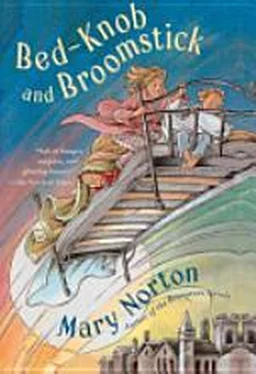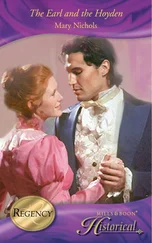Mary Norton - Bed-Knob and Broomstick
Здесь есть возможность читать онлайн «Mary Norton - Bed-Knob and Broomstick» весь текст электронной книги совершенно бесплатно (целиком полную версию без сокращений). В некоторых случаях можно слушать аудио, скачать через торрент в формате fb2 и присутствует краткое содержание. Жанр: Старинная литература, на английском языке. Описание произведения, (предисловие) а так же отзывы посетителей доступны на портале библиотеки ЛибКат.
- Название:Bed-Knob and Broomstick
- Автор:
- Жанр:
- Год:неизвестен
- ISBN:нет данных
- Рейтинг книги:5 / 5. Голосов: 1
-
Избранное:Добавить в избранное
- Отзывы:
-
Ваша оценка:
- 100
- 1
- 2
- 3
- 4
- 5
Bed-Knob and Broomstick: краткое содержание, описание и аннотация
Предлагаем к чтению аннотацию, описание, краткое содержание или предисловие (зависит от того, что написал сам автор книги «Bed-Knob and Broomstick»). Если вы не нашли необходимую информацию о книге — напишите в комментариях, мы постараемся отыскать её.
Bed-Knob and Broomstick — читать онлайн бесплатно полную книгу (весь текст) целиком
Ниже представлен текст книги, разбитый по страницам. Система сохранения места последней прочитанной страницы, позволяет с удобством читать онлайн бесплатно книгу «Bed-Knob and Broomstick», без необходимости каждый раз заново искать на чём Вы остановились. Поставьте закладку, и сможете в любой момент перейти на страницу, на которой закончили чтение.
Интервал:
Закладка:
"If one could write to him . . ." she suggested.
"Yes," said Carey, "but we can't.
Charles cleared his throat. "Would you like Paul and me just to run down and take a look at him?" Carey opened her mouth. "Without me?" she said indignantly.
"No, no," put in Miss Price. "It wouldn't be fair to leave Carey. Perhaps-" she hesitated-"perhaps we ought all to go." The children were silent. They dared not urge her. Carey crossed her thumbs and stared fixedly at the tablecloth.
"We could just go to his lodgings and peep in at the window. Just to see if he's all right, don't you know. We wouldn't disturb him. I think," said Miss Price, "it would be kind." The children did not speak.
"Once we knew he was all right," went on Miss Price, "we could come back and settle down happily to our lives." "Yes," said Carey guardedly.
"Don't you think?" asked Miss Price.
"Oh, yes," said Charles.
"Although this is a flying visit," said Miss Price, "I think we should be prepared for any emergency." She took down her father's sword from its hook on the wall and tested the blade with her finger. Then she strapped the scabbard to the bed rail. Carey and Charles were folding blankets, and Paul was opening out the ground sheet. It was nine o'clock in the morning, and they were all gathered together in Miss Price's bedroom to prepare for the journey.
"You see," went on Miss Price, "although I'm now convinced it is our duty to go, it is a great responsibility for me, now, at the end of the holidays. I don't feel justified in taking risks. I'm not sure that we shouldn't be disguised-" "How do you mean?" asked Charles.
"We look so very twentieth century," said Miss Price. "And it will be daylight this time." "I know!" exclaimed Carey. "Let's hire something from a costumer, like we did for the school play." "No, no," said Miss Price. "I couldn't go in fancy dress. I shouldn't feel myself at all-but I have that black cloak, and you children would be all right in long dressing gowns, pinned up at the neck." "Oh, Miss Price, that wouldn't look like anything. The costumer would have the exact dress. I have seven and sixpence." "It would cost more than seven and sixpence," said Miss Price. "And we're only going to stay ten minutes. Dressing gowns are good enough. You are always apt to overdo things, Carey, and become fantastic. Now help me turn the mattress." "I should think," said Carey, taking hold of the mattress, "we should look jolly fantastic walking about London in Charles IFs reign wearing twentieth-century dressing gowns pinned up at the neck-" "Now, Carey, that's enough. I have not the remotest intention of walking about London, and you're very lucky to be going at all." SO NEAR Emelius opened his eyes. Then he closed them again. The light hurt them. "It is a dream," he told himself, "a nightmare, the worst I have ever had." He felt cold, but too bruised and tired to mind that he felt cold. He just lay there, on the stone floor, trying not to wake up. But, after a while, his eyes seemed to open of their own accord, and he saw the small, barred window and the gray sky beyond. He sat up suddenly, and then cried out with pain as the movement hurt him. He smelt the wetness of his clothes, and his hands slipped on the floor. Slowly he began to remember: yesterday, the horsepond; today, the stake . . .
He had been betrayed. During the Fire of London men had lost their heads. A papist plot, they said, had caused it, and Frenchmen had thrown fireballs to burn the city. Somebody had spoken of Emelius, who live i so mysteriously in his dim lodging off Goat Alley, and king's men had searched his dwelling. There they found evidence of witchcraft and of sorcery, and when, on his return, he had walked up the dark stairway, two men had met him at the head and another, appearing from nowhere, cut off his retreat at the foot. He had been thrown into prison and tried, so angry were the people, almost immediately. When it was proved that he was no Frenchman, nor implicated in any "papist" plot, they accused him of having helped to cause the fire by magic. It was strange, they said, how he had left the city just before and returned when danger was over, and that his house, in the midst of such destruction, was barely touched.
Ah, the horsepond . . . that was terror! One little boy he remembered, a little boy with bare feet, who had run along beside him, ahead of the crowd, as they half dragged, half carried him towards the pond; a little brown-faced boy who shouted and jeered, showing his white teeth, and who stooped every few moments to pick a stone out of the dust. Emelius would try to duck, to shy away from that stone when it came singing through the air. He felt the little boy's laughing delighted face as part of the pain when the stone cut his cheek or glanced off his head.
And the tying of his hands and feet, the constable standing by, the clergyman's solemn face. And then the sickening plunge downwards to the green water, the floating duckweed ... a little parchment boat, half soaked, caught on a twig . . . and then the choking, greenish darkness . . . a noise in his ears like a scale played quickly on a violin. If he sank and died there in the water, it showed he was a human man and innocent of magic, but if he lived, that was a sign that he lived by supernatural powers, and they would burn him at the stake.
Then up he had come, choking, spluttering, coughing. The thick robe, tied at the ankles, had held the air. He saw the sunlight and heard the frightened quack of ducks. Then down, down again, into the water . . . the singing in his ears, the blackness; a blackness that thickened and spread, calming his fear, blotting out his thoughts.
And now it was morning. He had lain all night where they had thrown him on the cold floor. Cold . . . yes, he was cold, right through to the kernel of his heart, but he would not be cold for long; soon his wet clothes would steam; he would feel the hot steam rise upward past his face, and then his clothes would smolder; he would feel the heat of their smoldering against his skin, and their dry smoke in his nostrils-then, suddenly, the clothes would flare up into a running flame. . . .
The stake ... it was years since they had burned anyone at the stake. Witches and sorcerers were hanged nowadays, not burned. It was barbarous, monstrous, to burn a man alive! But the people were obsessed today by fire, fire, fire. . . .
"Oh," cried Emelius, putting his hands on his closed eyelids. "The stake . . . the stake . . . save me from the stake!" He sat quiet, his face hidden in his hands, as though, if he were still enough, he might find that, after all, he had died there in the horsepond and it was all over. "Here I am," he thought bitterly, "condemned for witchcraft, and I never knew a spell that worked." If it had been Miss Price-that would have been faker; she was a witch, a real one, but no one would dare burn her. No one would pull Miss Price out of her tidy little house and drag her down the High Street to the village green. If she paid her taxes, observed the English Sunday, and worked for the Red Cross, no one bothered what she did with the rest of her time. She could create a black cat as big as an elephant, and no one would molest her as long as she kept it off other people's property and did not ill-treat it.
"Oh, Miss Price, if you knew-" groaned Emelius, his eyes hidden, "if you knew that I am to be burned at the stake!" "I do know," said a voice. "They told me at your lodging." Emelius slowly drew his fingers from his eyes. He stared round the cell. It was empty.
His fear, perhaps, was turning him crazy. The voice had seemed real, not very loud, and quite matter-of-fact. And then he saw her-a face at the window, and two hands with whitened knuckles grasping the bars. The face stared at him from under a black cowl, and, at first, he did not recognize the shadowed eye sockets and the lips compressed with effort, but then the long nose leapt, as it were, into his fear-dimmed vision, a pink-tipped banner of indignation and righteous wrath.
Читать дальшеИнтервал:
Закладка:
Похожие книги на «Bed-Knob and Broomstick»
Представляем Вашему вниманию похожие книги на «Bed-Knob and Broomstick» списком для выбора. Мы отобрали схожую по названию и смыслу литературу в надежде предоставить читателям больше вариантов отыскать новые, интересные, ещё непрочитанные произведения.
Обсуждение, отзывы о книге «Bed-Knob and Broomstick» и просто собственные мнения читателей. Оставьте ваши комментарии, напишите, что Вы думаете о произведении, его смысле или главных героях. Укажите что конкретно понравилось, а что нет, и почему Вы так считаете.












